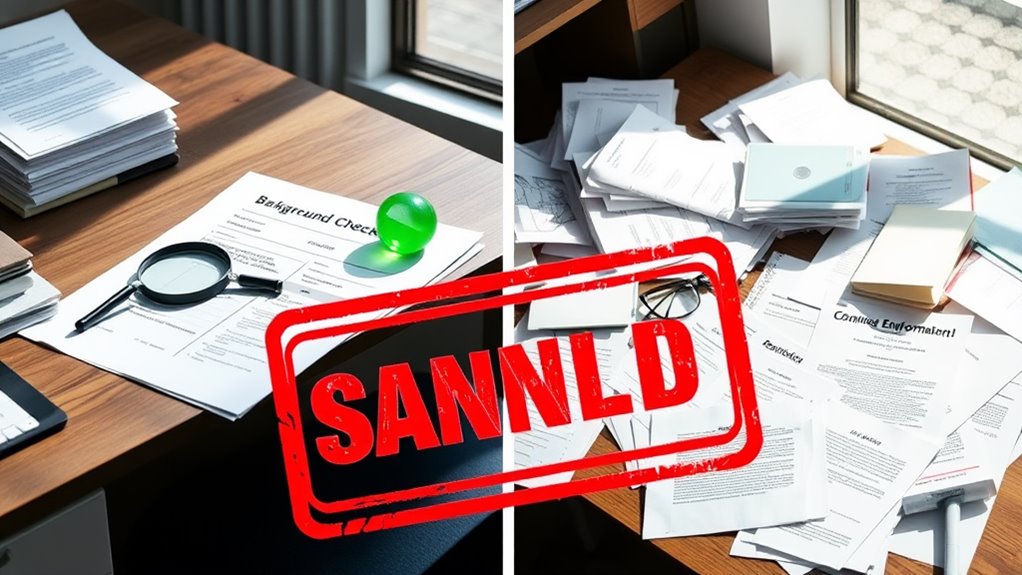Employment background checks are essential for hiring, but they must adhere to legal standards. Legal practices include obtaining written consent, providing candidates with reports if adverse actions occur, and following the Fair Credit Reporting Act. Illegal practices involve discrimination, accessing personal data without consent, and using outdated information. Employers must guarantee compliance to avoid legal repercussions. Understanding these distinctions clarifies the hiring process, and further exploration reveals best practices and guidelines for conducting compliant checks.
Key Takeaways
- Legal employment background checks require obtaining written consent from candidates before accessing their personal information.
- Illegal practices include discriminatory targeting based on race, gender, or age during the background check process.
- Employers must provide candidates with a copy of the background report if any adverse action is taken based on the findings.
- Compliance with the Fair Credit Reporting Act (FCRA) is essential to conduct legal background checks; violations can lead to legal ramifications.
- Transparency about the scope of information collected and the right to withdraw consent are crucial for maintaining legal and ethical standards.
Understanding Background Checks: What Employers Need to Know

Employers increasingly recognize the importance of conducting background checks as part of their hiring processes. Understanding the various background check types, such as criminal history, employment verification, and credit checks, is essential for guaranteeing informed hiring decisions. Each type serves a specific purpose, aiding employers in evaluating the trustworthiness and qualifications of applicants. However, while background checks are significant, they must be balanced with a respect for applicant privacy. Employers must navigate the boundaries of what information can be accessed and confirm they are compliant with privacy standards. This delicate balance between thoroughness in vetting and safeguarding personal data underscores the complexity of modern hiring practices, reinforcing the need for employers to remain both diligent and ethical in their approaches. Additionally, compliance with relevant laws ensures that background checks are conducted fairly and ethically.
Legal Guidelines for Employment Background Checks
While conducting employment background checks is a common practice among organizations seeking to enhance their hiring processes, it is imperative to adhere to established legal guidelines to guarantee compliance and mitigate risks. Employers must navigate a complex landscape of federal regulations and state laws that govern these checks. Key considerations include:
- Obtaining written consent from candidates before conducting checks.
- Providing candidates with a copy of the background report, if adverse action is taken.
- Adhering to the Fair Credit Reporting Act (FCRA) requirements.
- Being aware of state-specific laws that may impose additional restrictions.
Furthermore, pre-employment background checks not only ensure compliance but also help protect the company from potential risks associated with hiring.
Common Illegal Practices in Background Checks
Although many employers aim to conduct thorough background checks, several common illegal practices can undermine the integrity of the hiring process and expose organizations to legal liabilities. One prevalent issue is the use of discriminatory practices, where employers may inadvertently or deliberately use background information to unfairly target individuals based on race, gender, or age. Additionally, failing to secure proper consent before accessing personal data violates data privacy laws, leading to potential legal ramifications. Employers must also be wary of relying on outdated or inaccurate information, as this can skew decision-making and perpetuate biases. Recognizing and addressing these illegal practices is essential for fostering an equitable hiring environment and protecting both candidates and organizations from potential legal consequences. Furthermore, conducting background checks without adhering to Fair Credit Reporting Act requirements can lead to significant legal issues for employers.
The Role of Consent in Background Checking

Consent plays a pivotal role in the legality and ethicality of employment background checks. Employers must adhere to specific consent requirements to guarantee compliance with laws governing these practices. Informed consent involves clear communication about the nature of the background check and its implications for the applicant. Key aspects include:
- Transparency: Employers must inform applicants why the background check is conducted.
- Voluntary Agreement: Consent must be obtained without coercion.
- Scope of Information: Applicants should be made aware of what data will be collected.
- Right to Withdraw: Individuals must know they can revoke consent at any time.
Guaranteeing informed consent not only protects the rights of candidates but also fosters trust between employers and prospective employees. Additionally, using licensed private investigators can enhance the accuracy and thoroughness of the background check process.
Best Practices for Conducting Compliant Background Checks
Conducting compliant employment background checks requires adherence to established best practices that guarantee legal and ethical standards are met. Organizations must first obtain explicit consent from candidates, ensuring transparency and fostering trust. Thorough policies should outline compliant procedures, detailing the types of information to be collected and the methods employed. It is vital to utilize only reputable background check services that adhere to the Fair Credit Reporting Act (FCRA) guidelines. Additionally, employers should regularly review and update their background check policies to reflect any legal changes. Finally, candidates should be informed of their rights, including the opportunity to dispute any inaccuracies in their records, thereby reinforcing a fair and respectful hiring process. By following these practices, organizations can significantly mitigate risks associated with negligent hiring.
Frequently Asked Questions
What Types of Information Can Employers Legally Check?
Employers can legally check various information, including employment history and criminal records. Such checks provide insight into a candidate’s qualifications and potential risks, ensuring informed hiring decisions that align with organizational needs and values.
How Can Applicants Dispute Inaccurate Background Check Results?
Applicants can initiate a dispute process by contacting the reporting agency, providing evidence of inaccurate reporting. This method allows individuals to clarify discrepancies, ensuring that their background check accurately reflects their history and qualifications.
Are There Specific States With Stricter Background Check Laws?
Certain states implement stricter background check laws, emphasizing consumer protection and privacy. These state regulations can limit the types of information accessed and the time frame for reporting, considerably influencing hiring practices across various industries.
How Long Do Employers Keep Background Check Records?
Employers typically establish background check retention policies, often keeping records for one to seven years. This duration varies based on company requirements and applicable regulations, emphasizing the importance of understanding individual employer record policies for job seekers.
What Penalties Exist for Non-Compliant Background Checks?
Penalties overview for non-compliant background checks includes fines, legal action, and reputational damage. Employers must adhere to compliance requirements to mitigate risks and guarantee fair treatment of applicants in the hiring process, fostering trust and integrity.
Conclusion
In summary, steering through the complexities of employment background checks necessitates a thorough understanding of legal guidelines and ethical practices. Employers must guarantee compliance with regulations to avoid illegal practices that could lead to liability. Obtaining explicit consent from candidates is essential, as it fosters transparency and trust. By adhering to best practices, organizations can protect themselves while making informed hiring decisions, ultimately contributing to a fair and equitable employment process.






